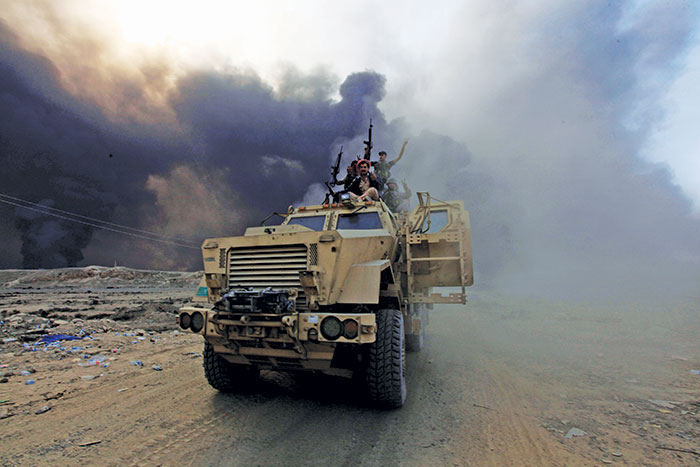
American calculations surround the battle for Mosul and its ramifications on the Middle East — the first aim is geopolitical and the second is electoral.
Mosul, considered the Iraqi capital of ISIS, is Iraq’s second largest city.
The first goal is connected to the war in Syria and the international showdown between Moscow and Washington over the fate of the country. The timing of the Mosul offensive and its delay were suspicious, despite the different calculations of the various groups fighting on the ground.
The wait gave ISIS an opportunity to adapt to the anticipated battle, giving the group the practical ability to consider the city “done” and withdraw its leaders and militants eastwards to Syria.
Stocking the terrorists up in Syria’s Raqqa would put pressure on President Bashar al-Assad and his Syrian allies. With the anticipated defeat of rebels in east Aleppo, Washington may be working to drain Moscow and Damascus in the upcoming battle for Raqqa, which is soon to become the last seat of Abu Bakr Albaghdadi’s “caliphate.”
Hezbollah leader Sayyed Hassan Nasrallah warned of this scenario when he urged Iraqi forces to close down routes to Syria for militants. He said Iraq cannot be stable and free of terrorism if terrorists are operating at its borders in Syria.
If terrorists were able to flee Mosul for Raqqa en mass, it would be a double headed strategic victory for Washington — ridding Iraq of ISIS in a rare success for its “war on terrorism” and sending the problem to the Russians to deal with it.
It has been reported that on the eve of the Mosul offensive, mosques in the city, which have been controlled by ISIS for 28 months, called on injured militants to flee with their families to Raqqa. Analysts expect that foreign “jihadis” will remain to quell Iraqi forces’ push for the city.
The main battle for the Middle East is no longer in Iraq.
On Thursday, Russia’s General Staff voiced concerns, hoping that the U.S.-led coalition would cut off all escape routes for the terrorists in Mosul.
“We hope that our partners from the international coalition realize what the consequences would be of having bands freely roaming around the Middle East. Terrorists should be destroyed on sight, not chased from one country to another,” said General Valery Gerasimov, chief of Russia’s General Staff.
The message was an implied warning that Russia is aware of the potential of ISIS militants moving to Syria.
Furthermore, an unidentified Russian military source told Russia Today that more than 9,000 ISIS terrorists plan to leave Mosul to carry operations in eastern Syria, including a push to recapture the historic city if Palmyra from the Syrian army.
It is worthy to note that in previous battles, Iraqi forces have overlooked strategic exit routes for ISIS militants to ease their way into cities like Tikrit and Fallujah.
The other aim of the Mosul battle is that President Obama is making a push for the city to bolster the campaign to his fellow Democrat Hillary Clinton, especially after GOP nominee Donald Trump accused the pair of creating ISIS.
However, Washington should know that tolerating terrorism for short term aims is a dangerous game. This lesson should have been learned from Afghanistan when the CIA trained and armed Islamist extremists to fight the Soviets. Those “Jihadists” soon turned against the hand that fed them and attacked the United States on Sept. 11, 2001.
Similarly, ISIS is becoming a global terrorist network. The group’s terrorists in Mosul should be cleansed and brought to justice, not relocated.






Leave a Reply